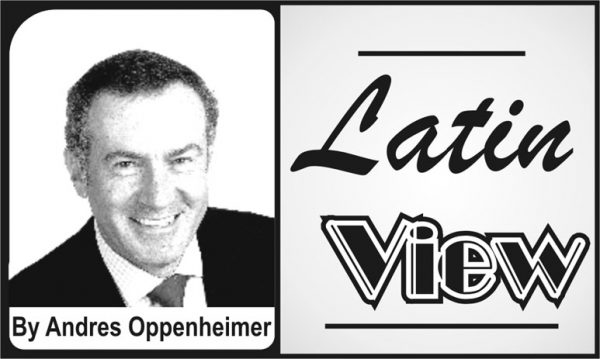
In Mexico, President-elect Andres Manuel Lopez Obrador will take office December 1, becoming the country’s first leftist leader in decades. In Brazil, there is growing speculation that leftist candidate Fernando Haddad will make it to a runoff election in October and take office on January 1.
Granted, it’s somewhat outdated to talk about “left” and “right” in today’s world. At a time when the biggest Communist country, China, practices the most unbridled capitalism — call it capitalism without the right to strike, if you want — the old labels of “left” and “right” have lost much of their meaning.
But for lack of better definitions, the big question is whether Mexico — and possibly Brazil — will shift to a populist left, or to a moderate one.
In Brazil, according to the latest Ibope survey, leftist Workers’ Party candidate Haddad is likely to win the No. 2 spot in the October 7 first-round elections. That would make him the frontrunner for the October 28 runoff vote, most Brazilian pundits agree.
Far-right candidate Jair Bolsonaro negatives are 46 percent, while Haddad’s negatives are only 30 percent. In a Haddad-Bolsonaro matchup, Haddad is the likely winner, polls show.
Haddad, a former education minister and mayor of Sao Paulo, is a moderate within former President Luiz Inacio Lula da Silva’s Workers’ Party. The former president, in prison on corruption charges, picked Haddad as his replacement.
I interviewed Haddad when he was education minister in 2010, and he struck me as a modern-thinking academic who was serious about improving academic standards. Later, as mayor of Sao Paulo, he introduced bike lanes and Uber rides to the city, infuriating taxi drivers’ unions.
Still, as a moderate within his leftist party, Haddad — who holds a master’s degree in economy and a PhD, in philosophy — would have to shift further to the center in order to win a runoff election.
On the other hand, Haddad’s running mate, Manuela D’Avila, is a Communist Party leader, and the Worker’s Party has a powerful radical leftist wing. The party’s president, Gleisi Hoffmann, has made no bones of her support for Venezuelan dictator Nicolas Maduro.
If Haddad becomes Brazil’s new president, we could see a scenario similar to that of Lula’s first term: a government that adopts pro-business economic policies at home, while branching out the country’s foreign policy to the Workers’ Party’s leftist wing. That would have a major impact on the region’s joint positions on issues such as Venezuela, Nicaragua, Iran and international trade.
In Mexico, Lopez Obrador — better known by his initials, AMLO — has vowed to lead a “fourth transformation” of the country. The meaning is still murky. But he has already said that he will turn back the clock on education and foreign policy, by reversing the country’s recent education reforms, and throwing Mexico’s current activism in support of democracy and human rights in Venezuela.
AMLO has said that he will go back to Mexico’s old doctrine of “non-interference” in other countries’ internal affairs. That policy often was invoked by Mexico in the 1970s and 1980s as a way to shield itself from foreign criticism — and as an excuse to support Cuba and other leftist dictatorships.
Will AMLO become a radical leftist? Probably not, at least not in the beginning. Most likely, he will be a champion of the “revolutionary nationalism” of his former party, the Institutional Revolutionary Party, which ruled Mexico for much of the 20th century. Much like the United States under President Trump, AMLO may lead a populist nationalist government.
With luck, a possible Latin American shift to the left would mark a return to a moderate, pro-free-trade left, like the one led by Brazil’s former President Fernando Henrique Cardoso. The alternative — radical populism — would be disastrous for the region. The Venezuelan humanitarian crisis has made this abundantly clear.





